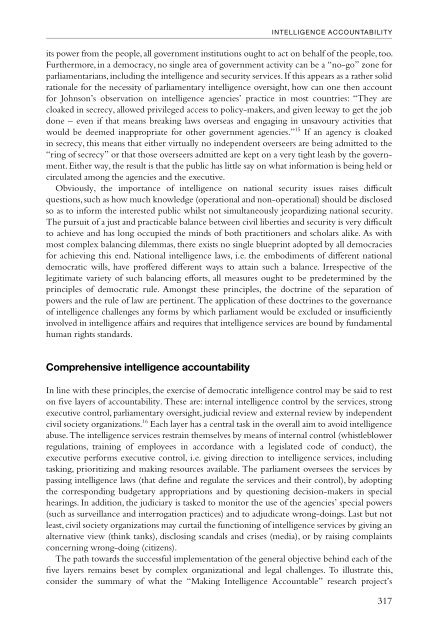Handbook of intelligence studies / edited by
Handbook of intelligence studies / edited by
Handbook of intelligence studies / edited by
Create successful ePaper yourself
Turn your PDF publications into a flip-book with our unique Google optimized e-Paper software.
its power from the people, all government institutions ought to act on behalf <strong>of</strong> the people, too.<br />
Furthermore, in a democracy, no single area <strong>of</strong> government activity can be a “no-go” zone for<br />
parliamentarians, including the <strong>intelligence</strong> and security services. If this appears as a rather solid<br />
rationale for the necessity <strong>of</strong> parliamentary <strong>intelligence</strong> oversight, how can one then account<br />
for Johnson’s observation on <strong>intelligence</strong> agencies’ practice in most countries: “They are<br />
cloaked in secrecy, allowed privileged access to policy-makers, and given leeway to get the job<br />
done – even if that means breaking laws overseas and engaging in unsavoury activities that<br />
would be deemed inappropriate for other government agencies.” 15 If an agency is cloaked<br />
in secrecy, this means that either virtually no independent overseers are being admitted to the<br />
“ring <strong>of</strong> secrecy” or that those overseers admitted are kept on a very tight leash <strong>by</strong> the government.<br />
Either way, the result is that the public has little say on what information is being held or<br />
circulated among the agencies and the executive.<br />
Obviously, the importance <strong>of</strong> <strong>intelligence</strong> on national security issues raises difficult<br />
questions, such as how much knowledge (operational and non-operational) should be disclosed<br />
so as to inform the interested public whilst not simultaneously jeopardizing national security.<br />
The pursuit <strong>of</strong> a just and practicable balance between civil liberties and security is very difficult<br />
to achieve and has long occupied the minds <strong>of</strong> both practitioners and scholars alike. As with<br />
most complex balancing dilemmas, there exists no single blueprint adopted <strong>by</strong> all democracies<br />
for achieving this end. National <strong>intelligence</strong> laws, i.e. the embodiments <strong>of</strong> different national<br />
democratic wills, have pr<strong>of</strong>fered different ways to attain such a balance. Irrespective <strong>of</strong> the<br />
legitimate variety <strong>of</strong> such balancing efforts, all measures ought to be predetermined <strong>by</strong> the<br />
principles <strong>of</strong> democratic rule. Amongst these principles, the doctrine <strong>of</strong> the separation <strong>of</strong><br />
powers and the rule <strong>of</strong> law are pertinent. The application <strong>of</strong> these doctrines to the governance<br />
<strong>of</strong> <strong>intelligence</strong> challenges any forms <strong>by</strong> which parliament would be excluded or insufficiently<br />
involved in <strong>intelligence</strong> affairs and requires that <strong>intelligence</strong> services are bound <strong>by</strong> fundamental<br />
human rights standards.<br />
Comprehensive <strong>intelligence</strong> accountability<br />
INTELLIGENCE ACCOUNTABILITY<br />
In line with these principles, the exercise <strong>of</strong> democratic <strong>intelligence</strong> control may be said to rest<br />
on five layers <strong>of</strong> accountability. These are: internal <strong>intelligence</strong> control <strong>by</strong> the services, strong<br />
executive control, parliamentary oversight, judicial review and external review <strong>by</strong> independent<br />
civil society organizations. 16 Each layer has a central task in the overall aim to avoid <strong>intelligence</strong><br />
abuse. The <strong>intelligence</strong> services restrain themselves <strong>by</strong> means <strong>of</strong> internal control (whistleblower<br />
regulations, training <strong>of</strong> employees in accordance with a legislated code <strong>of</strong> conduct), the<br />
executive performs executive control, i.e. giving direction to <strong>intelligence</strong> services, including<br />
tasking, prioritizing and making resources available. The parliament oversees the services <strong>by</strong><br />
passing <strong>intelligence</strong> laws (that define and regulate the services and their control), <strong>by</strong> adopting<br />
the corresponding budgetary appropriations and <strong>by</strong> questioning decision-makers in special<br />
hearings. In addition, the judiciary is tasked to monitor the use <strong>of</strong> the agencies’ special powers<br />
(such as surveillance and interrogation practices) and to adjudicate wrong-doings. Last but not<br />
least, civil society organizations may curtail the functioning <strong>of</strong> <strong>intelligence</strong> services <strong>by</strong> giving an<br />
alternative view (think tanks), disclosing scandals and crises (media), or <strong>by</strong> raising complaints<br />
concerning wrong-doing (citizens).<br />
The path towards the successful implementation <strong>of</strong> the general objective behind each <strong>of</strong> the<br />
five layers remains beset <strong>by</strong> complex organizational and legal challenges. To illustrate this,<br />
consider the summary <strong>of</strong> what the “Making Intelligence Accountable” research project’s<br />
317
















